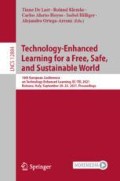Abstract
Social media has become an important part of adolescents’ lives, with an increasing number of teenagers spending a great part of their time creating, sharing, and socializing with online content. Although the popularity of social media keeps growing, different studies identified threats and dangers that exist in such networks. From harmful content to negative behaviors, users can fall victim to negative social media phenomena that can affect their mental health and wellbeing. Several media literacy initiatives have been designed to promote social media awareness amongst the youth using traditional approaches to teaching about social media risks and threats. However, these approaches are limited in enabling deep reflection about the dangers behind their social media interactions and empowering their empathy, perspective-taking, critical thinking, digital and self-protection skills. This demo paper introduces a perspective in this context proposing the integration of educational opportunities within social media. The proposed approach is designed as a social media simulated learning platform where embedded learning activities follow a novel “narrative scripting” approach, in which Computer Supported Collaborative Learning script mechanisms are combined with counter-narratives strategies.
Access this chapter
Tax calculation will be finalised at checkout
Purchases are for personal use only
References
Rideout, V., Robb, M.B.: Social Media, Social Life: Teens Reveal Their Experiences. Common Sense Media, San Francisco, CA (2018)
Weinstein, E.: The social media see-saw: positive and negative influences on adolescents’ affective well-being. New Media Soc. 20(10), 3597–3623 (2018)
Redmiles, E. M., Bodford, J., Blackwell, L.: I just want to feel safe: a diary study of safety perceptions on social media. In: Proceedings of the International AAAI Conference on Web and Social Media, vol. 13, pp. 405–416 (2019)
O’Reilly, M.: Social media and adolescent mental health: the good, the bad and the ugly. J. Ment. Health 29(2), 200–206 (2020)
Adelhardt, Z., Markus, S., Eberle, T.: Teenagers’ reaction on the long-lasting separation from smartphones, anxiety and fear of missing out. In: Proceedings of the 9th International Conference on Social Media and Society, pp. 212–216 (2018)
Buckingham, D.: Defining digital literacy. In: Medienbildung in neuen Kulturräumen, pp. 59–71. VS Verlag für Sozialwissenschaften (2010)
McLean, S.A., et al.: A pilot evaluation of a social media literacy intervention to reduce risk factors for eating disorders. Int. J. Eat. Disord. 50(7), 847–851 (2017)
Krutka, D., Manca, S., Galvin, S., et al.: Teaching “against” social media: confronting problems of profit in the curriculum. Teach. Coll. Rec. 121(14), 1–19 (2019)
Ognibene, D., et al.: Challenging Social Media Threats using Collective Well-being Aware Recommendation Algorithms and an Educational Virtual Companion. arXiv preprint arXiv:2102.04211 (2021)
Hazel, P.: Toward a narrative pedagogy for interactive learning environments. Interact. Learn. Environ. 16, 199–213 (2008)
Davies G, Ouellet M, Bouchard M: Toward a framework understanding of online programs for countering violent extremism. J. Deradicalization Spring 6, 51–86 (2016)
Ludvigsen, S., Cress, U., Law, N., Rosé, C.P., Stahl, G.: Collaboration scripts and scaffolding. Int. J. Comput.-Support. Collab. Learn. 11(4), 381–385 (2016). https://doi.org/10.1007/s11412-016-9247-1
Jermann P, Dillenbourg P.: An analysis of learner arguments in a collective learning environment. In: Proceedings of the 3rd Conference on CSCL, USA, pp. 265–273 (1999)
Aronson, E.: The Jigsaw Classroom. Sage, Thousand Oaks (1978)
Hernández-Leo, D., Martinez-Maldonado, R., Pardo, A., Muñoz-Cristóbal, J.A., Rodríguez-Triana, M.J.: Analytics for learning design: a layered framework and tools. Br. J. Educ. Technol. 51(1), 139–152 (2019)
Pixelfed Homepage. https://pixelfed.org/. Accessed 15 April 2021
Ryan, R.M.: Control and information in the intrapersonal sphere: an extension of cognitive evaluation theory. J. Pers. Soc. Psychol. 43(3), 450 (1982)
Ryan, R.M.: Control and information in the intrapersonal sphere: an extension of cognitive evaluation theory. J. Pers. Soc. Psychol. 43, 450–461 (1982)
Acknowledgments
This work has been partially funded by the Volkswagen Foundation (COURAGE project, no. 95567). TIDE-UPF also acknowledges he support by FEDER, the National Research Agency of the Spanish Ministry, TIN2017–85179-C3–3-R and by ICREA under the ICREA Academia programme (D. Hernández-Leo, Serra Hunter).
Author information
Authors and Affiliations
Corresponding author
Editor information
Editors and Affiliations
Rights and permissions
Copyright information
© 2021 Springer Nature Switzerland AG
About this paper
Cite this paper
Hernández-Leo, D., Theophilou, E., Lobo, R., Sánchez-Reina, R., Ognibene, D. (2021). Narrative Scripts Embedded in Social Media Towards Empowering Digital and Self-protection Skills. In: De Laet, T., Klemke, R., Alario-Hoyos, C., Hilliger, I., Ortega-Arranz, A. (eds) Technology-Enhanced Learning for a Free, Safe, and Sustainable World. EC-TEL 2021. Lecture Notes in Computer Science(), vol 12884. Springer, Cham. https://doi.org/10.1007/978-3-030-86436-1_42
Download citation
DOI: https://doi.org/10.1007/978-3-030-86436-1_42
Published:
Publisher Name: Springer, Cham
Print ISBN: 978-3-030-86435-4
Online ISBN: 978-3-030-86436-1
eBook Packages: Computer ScienceComputer Science (R0)

